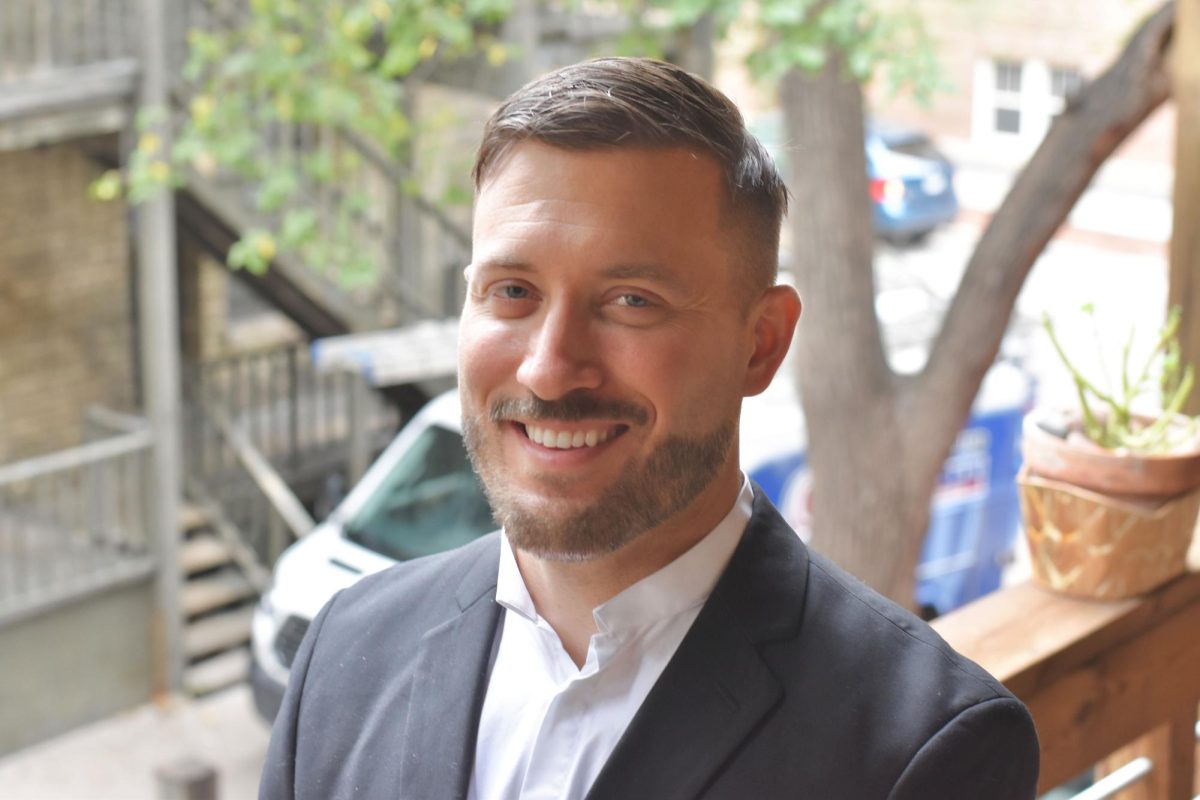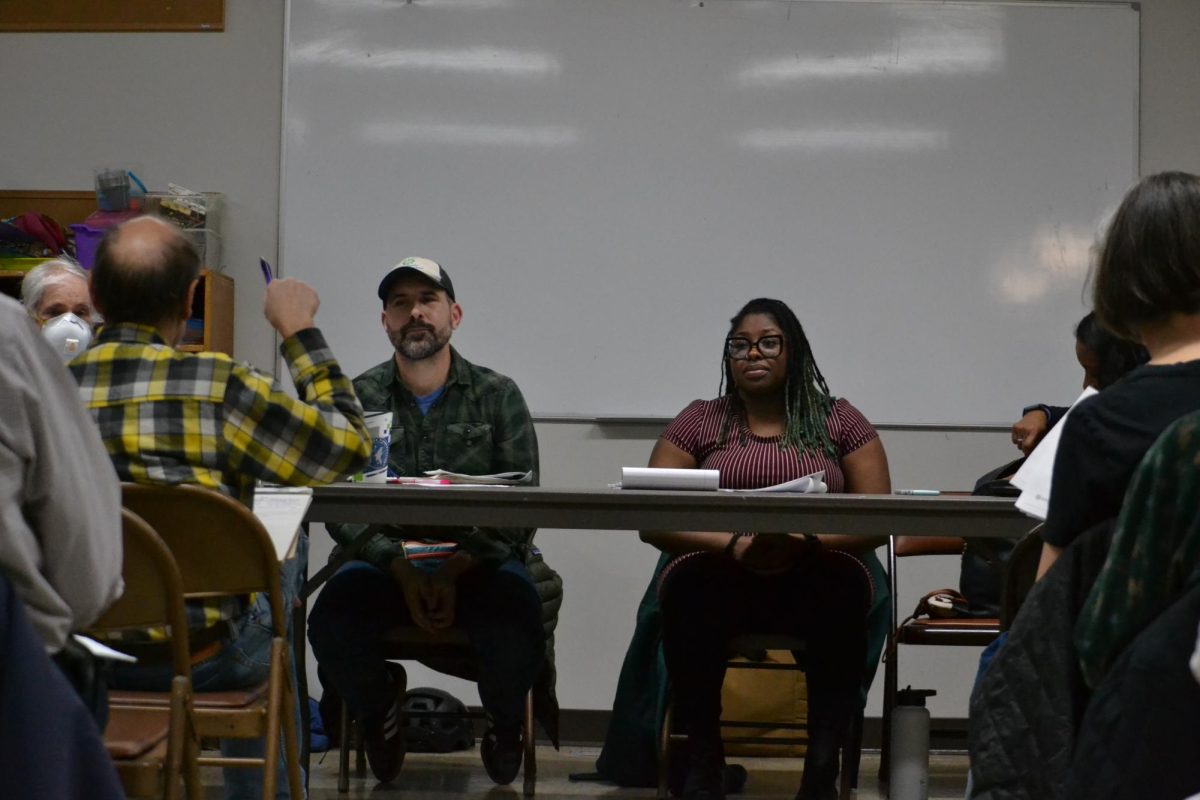Ward 2 write-in candidate Michael Baskins is running against incumbent council member Robin Wonsley in the upcoming Nov. 7 elections.
Ward 2 covers Marcy-Holmes, Prospect Park, Como, Cedar-Riverside and the University of Minnesota campus. Wonsley has been the Ward 2 council member and has run unopposed since 2021.
Wonsley is Minneapolis’s first Black Democratic socialist council member and has contributed to blocking the relocation of the 3rd Precinct police station and led discussions on police accountability and reform.
Baskins began his campaign as a challenger to Wonsley in September and said he wanted to provide an alternative choice for Ward 2 residents. Baskins said he cares about all sides of policy-making and wants to focus on improving Minneapolis’ job opportunities, housing and public safety.
Wonsley and Baskins sat down with the Minnesota Daily for a Q&A to learn more about their campaign’s priorities.
Minnesota Daily: Ward 2 covers student residents such as the University of Minnesota and Augsburg University. How would you ensure student voices are heard and give authority to their concerns?
Michael Baskins: “I think the best way to do that is to have regular consultations with some of the most connected student groups in the University, the student government, the paper, the student council. I would work on a regular basis, on a monthly basis to communicate with each of those groups on what they’re hearing from the students on what the student issues are on the ground and certainly make their voices heard at the City Council level.
“It needs to happen every year to the students to let them know who their representative is because every year the students change. I think that’s one of the biggest challenges of campus is that it’s really hard to get every successive group of students to know who you are and to know who to contact you, but that would be built into my sort of marketing plan for each year.”
Robin Wonsley: “There are still lots of things to learn, but I’m so proud of my office for the outreach we’ve done both at the University of Minnesota and Augsburg University to build relationships with student leaders and campus organizations, to set up regular meetings with those students to hear about what concerns are at the top of their minds and be on campus and off campus. Oftentimes or throughout my term, I’ve been on campus, at minimum, at least once or twice a week to just hear from students. We’ve also worked with professors. I’ve spent lots of time partnering with classes.
“We were able to also work with the students who were impacted by the Identity fiasco to now bring forward an ordinance that will make sure that no student going forward or renter will be stuck in a pre-lease agreement without some way of seeking recourse. It’s through collaboration like that that we’re even able to bring rental rights policies that are reflective of a lot of the issues that student renters are experiencing.”
Daily: Minneapolis has a long history of controversies with policing, concerns of lack of accountability and the federal and state consent decrees with the Minneapolis Police Department. What do you want to change within Minneapolis policing?
Baskins: “I think it’s really important that we rebuild trust by communicating with the community what these consent decrees look like, what visibility and oversight power we have as the council, and then make sure that we are communicating what we’re learning in real-time to the community, essentially. I genuinely want to work with the police department on how we can support them in getting officers hired quicker and preventing the attrition of officers that they currently have.
“I think that the Violence Interrupter Program is an excellent idea where they’re sending social workers to mental health crisis calls, and I support that and I would continue funding that. But I would make sure and audit it, make sure that it’s working collaboratively between the police and that both sides are communicating well.”
Wonsley: “We’re super excited to really dig into this next police contract to make sure that it does have stronger provisions around discipline, around reforms and also removing language that might be harmful for residents. I also am proud of the work that we’ve done to foster transparency around it. My office led getting the contract released to the public last year, that had never happened before. Our conversations then prompted community listening sessions last summer, again, something that had never happened before.
“One of my biggest priorities has been public safety beyond policing. Even our officers know that the model of overreliance on just law enforcement is not sustainable for them and it does not work for our constituents. Our BCR program, which is our mental health response 9-1-1 dispatch service, has been the clearest indicator of, you know, investing in public safety beyond policing actually works. Our officers love that program because they recognize that themselves, they are not qualified mental health experts and they were excited as well as our residents.”
Daily: Ensuring affordable housing and rent control has been a recent concern for Minneapolis residents; how would you help ensure affordable housing is accessible to the public?
Baskins: “Rent control that is a 3% cap on the rate on rent hikes per year would be the most, you know, extreme in the country. We’ve seen through studies that rent control does, and I’ll just say this again, that rent control does limit the construction of new housing, diminishes the quality of housing because landlords don’t put money back into it.
“Instead of that, I would do targeted investment in low-income housing. That’s what we’re doing right now, and I think that it’s working fantastically. There’s countless articles that you can read about Minneapolis as a true leader in affordable housing.”
Wonsley: “Our office has been a major champion in calling for increased investments in public housing, and just this year alone we were able to work with our state-wide leaders as well as other local leaders like the board of estimates and taxation president to raise an unprecedented ten million dollar allocation to the Minneapolis public housing authority. That also resulted in an annual public housing levy being restored that will automatically assure five million dollars for public housing every single year.
“I’m super excited to work with my colleagues to advance a humane response policy. It’s very clear the whack-a-mole approach that we’ve been utilizing and dealing with our growing unhoused community is not working. We will evict an encampment and then you’ll see multiple encampments pop up nearly a few hours later and then we’re back in the same cycle. This is why we know that we have to do things that ensure the increase, or the expansion of actual affordable housing.”
Daily: How would you support small businesses in Minneapolis?
Baskins: “I would listen to the needs of small businesses in the corridor and understand what their particular challenges are because they’re not all the same. One example is there was a desire to remove parking on Hennepin Avenue and I’ve mentioned this on my website. The small businesses were very concerned, sort of unanimously, that they would lose a large percentage of their business. It’s very hard to find parking, of course, as you know, in that area of the city, and if there’s no street parking, it’s going to dramatically affect those small businesses.
“A more general policy on how to support small businesses. Well, first of all, public safety is a big thing, right? So a lot of small businesses are very, sort of have been, very affected by sort of less safe neighborhoods. I certainly would direct the law enforcement public safety officers to ensure the protection in those areas.”
Wonsley: “I’m very proud of my colleague Jeremiah Ellison, who was able to get a substantial increase in funding for that program because it’s been super successful and we need more initiatives like that. Also with the rent control policy, I think we absolutely, as I mentioned within and regards to the commercial space in that being costly, with us moving into our new development model where, you know, we have the baseline of these structures being related to commercial space that are super costly, I do think we need to be looking at what our protections that we can also be leveraging to support leasers of commercial spaces.
“I’m a staunch worker advocate, pro-union all day every day. I cut my teeth and politics by working on the 15 minimum wage campaign and I’ve worked for unions, our teachers’ unions since then. I understand that you cannot have any type of business or you can’t be a leader in any industry without having workers. You have to have workers and that means those workers need to be also taken care of. They need to be paid beyond a livable wage. They need to be provided benefits like health care so that they’re not having to work multiple jobs in order to take care of those things or go without those particular needs. Anything that we can also do to make sure that workers are getting the pay and rights that they deserve is also crucially important.”
This interview has been edited for clarity and length.





























